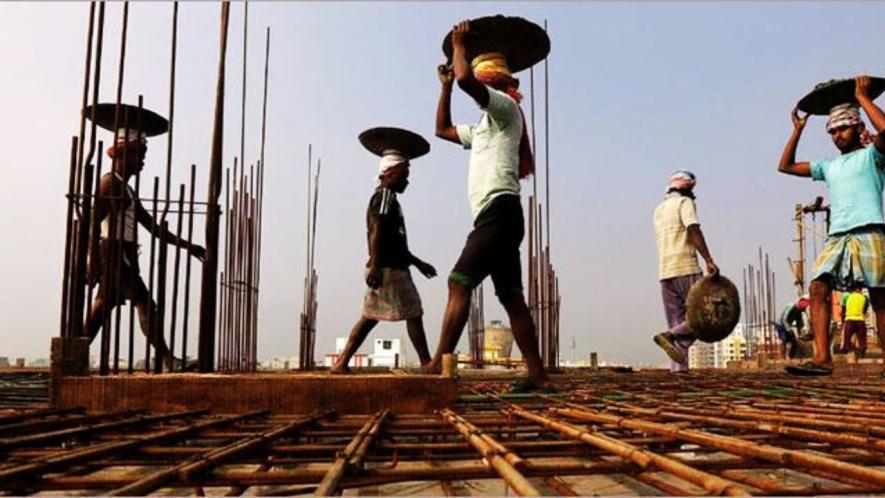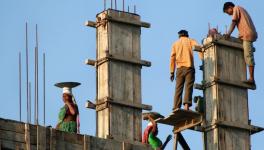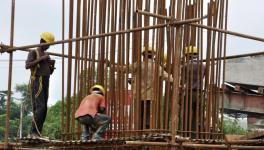Construction Workers’ Welfare: Anatomy of a Fall

File Image
Employment in the construction industry increased from 41 million to 71 million between 2011 to 2023. Most of these workers are migrants from the most marginalised sections of society, living either in slums or makeshift dwellings at their workplace in the absence of better access to water, sanitation and food. These workers are often employed on less than minimum wages; cases are prevalent where they get minimum wages from the employer, and they later have to transfer a portion (cut money) to either their contractor or subcontractors. With the rise in construction jobs, there is a rising number of accidents at the workplace leading to deaths.
Read Also: LABOUR LOG: 13 Workers Died at Workplace Last Week, Mostly on Construction Sites
Unfortunately, all these issues exist in the presence of legislative safeguards. The Central legislature enacted the Building and Other Construction Workers (Regulation of Employment and Conditions of Service) Act, 1996 (hereafter the BOCW Act or the Act) the Building and Other Construction Workers Welfare Cess Act, 1996 (hereafter BOCW Cess Act) to regulate their employment and other work-related issues.
The Act includes the construction, alteration, repairs, maintenance or demolition of any construction-related works under 'Building and other construction work'. It applies to all 'establishments' that employ 10 or more building workers in a year. The Act further lays down detailed provisions related to occupational safety, weekly and daily working hours, payment of wages, overtime, access to drinking water, sanitation, free accommodation, inter alia.
Safety Provisions
The Act lays down important safety guidelines to be ensured by the employer at the construction site. Some provisions are detailed, including the use of a harness when working above a certain altitude, wearing a helmet and safety shoes, and specifying the maximum weight load a worker can carry. As per the BOCW rules, an adult male worker can lift 55 kg and a female worker 30 kg of weight either on the head or their shoulder. However, it is common to see workers carrying bulky construction materials.
The Act further mandates large establishments that effectively employ more than 500 or more construction workers to constitute a safety committee consisting of both the representatives from employers and construction workers. Some of the important functions of the committee are to identify prone areas of work and suggest rectifications of unsafe practices.
Death, Injuries at Work Sites Often Unreported
Deaths and injuries in construction work are a reality, often resulting from negligence by contractors and employers. Safety apparatuses are often a rarity in the construction sector, additionally, they are of substandard quality, if available.
Rule 210 lays down the detailed procedure for the reporting of all sorts of accidents at construction sites. Reports suggest that there are 38 fatal accidents per day at construction sites across the country. Major employers in the sector don't often let accident or death news come out, and workers' families are given a meagre compensation amount through contractors or subcontractors and are asked to keep mum about it.
The provision to provide better rehabilitation and compensation to the injured workers is available both under this act and the Employee’s Compensation Act, 1923. But on the ground, it remains chiefly inaccessible to the beneficiaries; courtesy: hindrance to ‘access to entitlement’ and ‘tiring administrative processes’.
Absence of Job Training and Promotions
The employment of construction workers increased from 41 to 71 million between 2011 and 2023. Out of 71 million workers employed in the sector, nearly 81% are unskilled. Despite the growing demand, there is a dearth of skilled workers in the sector. Most of the migrant workers travel to big cities to find work and land for construction work, as a natural choice. These workers are often trained informally but are not recognised as skilled workers by the employer.
During one of my fieldwork visits to a construction site in Delhi, I was appalled to see a father-son duo from Jharkhand working as mason helpers. The father had been working as a helper for 20 years, while his son had joined him after the Covid pandemic. Despite 20 years of work experience, the father was never promoted to a skilled worker.
The absence of job training further reduces the promotion probability for these workers and they continue to work in the same position for life. This disables workers' growth and makes them stagnant, leaving them vulnerable to poverty.
BOCW Boards and Welfare Schemes
An important feature of the BOCW Act is the establishment of State Welfare Boards (SWB) in each state and Union Territory across the country. Under the BOCW Cess Act, these boards are mandated to levy 1-2% cess on the (total) construction cost. The (BOCW Cess) Act says that the cess collected is to be utilised for the rolling out schemes for the workers. Section 22 of the Act, details the different welfare schemes related to the education of workers, their spouses, children, health, maternity, injury compensation, housing and pensions schemes.
According to the Mission Mode Project Guidelines (Ministry of Labour and Employment, 2020), approximately Rs 38,000 crore are lying unutilised with the BOCW state welfare boards. These boards, sitting on the underutilised funds, have caused injustices to the BOCW Workers.
A Few Good Steps
Of late, initiatives like Social Compact (A collective of Dasra, Ajeevika Bureau and Centre for Social Justice) are committed to the larger goals of bringing a change in workers' lives by focusing on six outcomes, namely, —wages, health, safety, gender, access to entitlement and future of work.
Many SWBs are now providing financial assistance to workers to buy bicycles, tools and instruments. The Maharashtra board offers a safety and work kit containing a torch, tiffin box, helmet, safety shoes, harness and gloves. Taking a step ahead, the Gujarat board has rolled out the 'Shramik Manpasand Pass scheme’, a free bus pass scheme in collaboration with the transport department in four cities -- Ahmedabad, Vadodara, Surat and Rajkot. The scheme aims to reduce these workers' travel costs and, therefore, help them achieve better working conditions. Similarly, Bengaluru Metropolitan Transportation Corporation (BMTC) free bus passes have been issued to registered construction workers to commute in BMTC buses.
Multinational construction giants like L&T have also rolled out training courses for unskilled workers under their flagship 'Construction Skills Training Institutes' spread across the country.
Way Forward
The BOCW Act is a comprehensive legislation covering significant issues related to construction workers. The SWB can be connected with the ‘E-shram’ worker’s registration portal to provide direct scheme benefits to workers. The SWBs need to accelerate the hassle-free registration process of the eligible construction workers. It should also facilitate registration through missed calls, ease in membership renewal, and easy transfer of membership from one state to another as laid down under the Mission Mode Project Guidelines, 2020. State Welfare Boards must realise that the BOCW fund is meant for the workers, and it must be spent on them.
The writer teaches labour laws at Presidency University, Bengaluru. The views are personal.
Get the latest reports & analysis with people's perspective on Protests, movements & deep analytical videos, discussions of the current affairs in your Telegram app. Subscribe to NewsClick's Telegram channel & get Real-Time updates on stories, as they get published on our website.
























